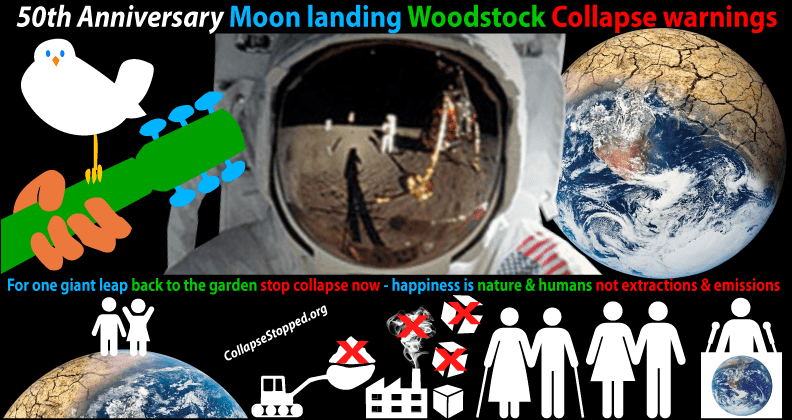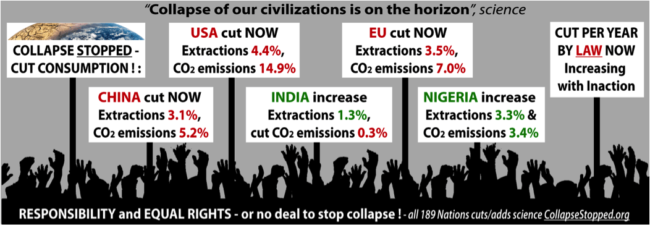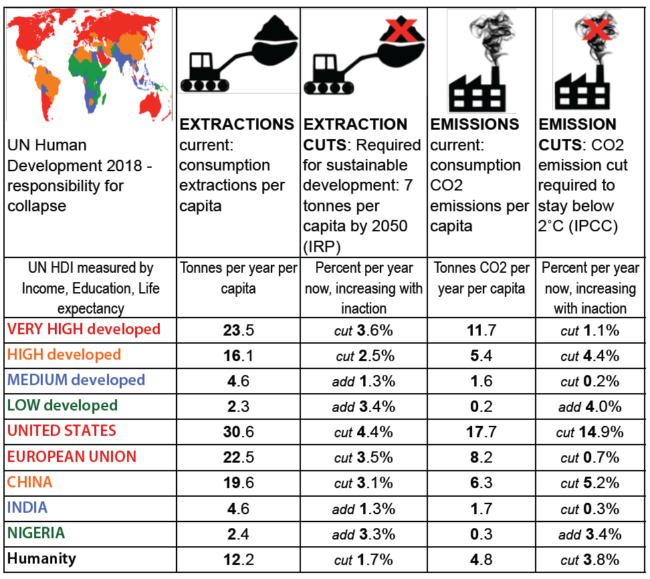Author(s): Collapse Stopped
Unique report gives 189 nations’ actions required to stop ‘global collapse’
For 50 years science advice has been to “cut by sometime in the future”, and the cuts never happen; to stop collapse nations must “cut now, increasing with inaction”.
The report emphasizes that the objective to “Save the future” is at least 50 years old; to achieve this demands for action must change from “11 Years Left” to “NOW”, and from general concepts “Make Earth Day Everyday” to real physical reality tonnes, “Cut Extractions and Emissions by Responsibility”, see below.
The new report – Collapse stopped, what you can do– concludes that from scientists to students, demands on governments must change from “global cut by sometime in the future” to “all nations cut/add by responsibility now increasing with inaction”, or economic and social collapse is inevitable. For example.
-From: EU cut by sometime in the future. The Intergovernmental Panel on Climate Change’s (IPCC, the climate science authority) current key advice to limit global warming for all nations is: “CO2emissions decline by about 45% from 2010 levels by 2030… reaching net zero around 2050” with “responsibility” and “equity” which IPCC will not specify. Students and others repeat the advice; history shows the cuts won’t happen.
-To: EU cut now. “To stop global collapse by responsibility EU must cut natural resource extractions 3.5% and CO2emissions 7.0% this year – 398 million tons of extractions and 291 million tonnes of CO2. Cut a total of 689 million tonnes this year. the weight of 68,900 Eiffel Towers or 13,780 Titanics, increasing with inaction.” If the EU fails to cut 689 million tonnes this year, next year’s required reduction will increase accordingly.
“People who say, ‘These cuts are impossibly high’, must add, ‘collapse is inevitable, my child’s future is destroyed’”, warns Michael Wadleigh, one of the authors, an Oscar-winning director and scientist.
“Science Academy Presidents, Nobel laureates and other eminent scientists (below) representing almost every nation support ‘1 Planet / 1 atmosphere, equal rights’, this isn’t a radical proposal”, says author Birgit van Munster. “An international agreement is required to stop collapse, and without equal rights and responsibility there likely will be none.”
Here is the key data for five key nations and the four UN Human Development levels from the report:
Download all 189 nations CollapseStoppedOrg-189NationsEssentials
Key facts from the report.
- For a half-century eminent scientists have warned of economic and social collapse caused by humanity’s relentlessly rising destruction of nature (including climate) from which humans, all products and all life are made.
- The warnings have been completely ignored; in the last 50 years global natural resource extraction has nearly quadrupled, greenhouse gas emissions and their warming effect in the atmosphere has more than doubled.
- Astonishingly the next 35 years of resource extraction and fossil fuel emissions are projected to equal the cumulative extractions and emissions of the past 300,000 years, the entire time of the H. sapiens species – and it won’t stop there. Social and economic collapse is inevitable and imminent.
For five decades the science advise to “protect and preserve” nature has been ‘Cut global consumption by sometime in the future, by 1980… by 1990… by 2030’. Lawmakers laugh, “Cut by 2030, by 2050 is someone else’s problem, I’ll be out of office or dead!”For a half-century cuts never happened, the relentless rise continues unabated.
The report concludes:
To hold global warming below 2°C, to develop sustainably and to stop collapse science advice and human action must change from political-economic-social reality– “Cut global consumption by sometime in the future” – to real reality, “189 Nations cut/add consumption by responsibility now increasing with inaction”.
“The report emphasizes that voluntary action – recycle, eat less meat, don’t fly – have been tried for decades without success and they will never succeed, LAWS demanded by citizens including students are required NOW”, Birgit van Munster.
“Since 1969, the 50 years I’ve been active, ‘measures to counteract climate change’ have been known. 12 years ago the Nobel Prize was given to ‘build up and disseminate greater knowledge on man-made climate change and to lay the foundations for measures to counteract climate change’. The next Prize must be awarded only for real reality counteracting measures – for cuts by responsibility now”, Michael Wadleigh.
Here’s how the calculations are done, EU for example:
To hold global warming below 2˚C: the IPCC “carbon budget[1]” remaining on 1 Jan 2019 was 900 GtCO2; with a global population of 7.7 billion this is 117 tCO2per person – equal rights. The EU has 510 million people so EU total limit is 60.0 GtCO2– equal rights. The EU currently emits 4.1 GtCO2per year – the EU limit will be emitted in about14 years! To avoid exceeding the limit the EU must cut CO2emissions 7.0% per year NOW increasing with inaction. The EU’s long term average cut is 0.7%, only 1/10thof what is now required by responsibility.
For sustainable development: the International Resource Panel (IRP, humanity’s natural resource authority) concluded that natural resource extractions must be limited 7 tonnes per capita per year by 2050 – equal rights[2]. The EU currently consumes 22.5 tonnes of resources per person; by responsibility the EU must reduce 3.5% per year now increasing with inaction. EU’s long term average consumption extractions are increasing1.4% per year.
[1]To limit global warming to 2˚C with >66% probability, accounting for earth system feedbacks, relying on very rapid reduction of non-CO2 forces, no temperature overshoot and no negative emissions, global carbon emissions must be limited to 1030 GtCO2 from 1/1/2019 onwards, or about 900 GtCO2 for combustion of fossil fuels and industry -not including land-use emissions-. IPCC SR1.5 2018, Global Carbon Project 2018.
Cuts are calculated for intergenerational equity, not relying on negative emissions.
[2]UNEP International Resource Panel, Managing and Conserving the Natural Resource Base for Sustained Economic and Social Development. A reflection from the International Resource Panel on the establishment of Sustainable Development Goals aimed at decoupling economic growth from escalating resource use and environmental degradation (2014).
UNEP IRP Global Material Flows Database, data download January 2019
Science Initiative 1 Atmosphere (1 Planet) equal rights and responsibility –
Dr. Yuan Lee, Nobel Prize winner and President of the International Council for Science (ICSU)
Dr. Olive Shisana, President of the International Social Sciences Council (ISSC)
Dr. Ivo Slaus, President of the World Academy of Arts and Sciences (WAAS)
Dr. Daya Reddy, co-Chair of the InterAcademy Panel (IAC),
Dr. Jacob Palis, I.P. President of The World Academy of Sciences (TWAS)
Dr. Mohamed Hassan, co-Chair Global Network of Academies of Science (IAP)
Dr Lars Walloe, President of the Academia Europaea
Dr. Gunter Stock, President of All European Academies (ALLEA)
Dr. Juan Asenjo, co-Chair InterAmerican Network of Academies of Science (IANAS)
Dr. Claudio Bifano, President Academia de Ciencias de America Latina (ACAL)
Dr. Won-Hoon Park, President of the Association of Academies and Societies of Sciences in Asia (AASSA)
Dr. Robin Crewe, President of the Network of African Science Academies (NASAc)
Dr. Berhanu Abegaz, Executive Director of the African Academy of Science (AAS)
Dr. Ahmadou Ndiaye, President of the African Academy of Science (AAS)
Dr. Keto Mshigeni, Vice President of The World Academy of Science (TWAS)
Dr. Atta-ur-Rahman, President of the Network of Academies of Sciences in Islamic Countries (NASIC)
Dr. Abdel Salam Majali, President of the Islamic World Academy of Sciences (IAS)
Dr. Mouneef Zo’ubi, Secretary General Islamic World Academy of Sciences (IAS);
Dr. Trevor Alleyne, President of the Caribbean Academy of Sciences (CAS)
Dr. Nelson Moreno Ceballos, President of the Caribbean Scientific union (CCC)
Dr. Kazu-yuki Tatsumi, President International Union of Pure and Applied Chemistry
Dr. Alik T.Ismail-Zadeh, Secretary General of the International Union of Geodesy and Geophysics (IUGG);
Dr. Nils Stenseth, President of the International Union of Biology (IUB)
Dr. Gregory Petsko, President of the International Union of Biochemistry and Molecular Biology (IUBMB);
Dr. Roland Oberhänsli President of the International Union of Geological Sciences
Dr. Michael Burawoy, President of the International Sociological Association (ISA)
Dr. Sathasivian Saths Cooper, President of the International Union of Psychological Science
Dr. Andrew Spiegel, Vice President of the International Union of Anthropological and Ethnological Sciences (IUAES)
Dr. Thomas Reuter, Founding chair World Council of Anthropological Associations
Dr. Roseanne Diab, Executive Officer Academy of Science South Africa (ASSAf)
Dr. Oyewale Tomori, President of the Nigerian Academy of Science (NAS)
Dr. Rafael Munavu, President of the Kenya National Academy of Science (KNAS)
Dr Ahmedou Ndiaye, President Senegal Academie des Sciences et Techniques (SAST)
Dr. Ester Mwaikambo, President of the Tanzania Academy of Sciences (TAAS)
Dr. Demissie Habte, President of the Ethiopia Academy of Sciences (EAS)
Dr. Paul Mugambi, President of the Uganda National Academy of Sciences (UNAS)
Dr David Mutekanga, Executive Secr. Uganda National Academy of Sciences (UNAS)
Dr. Mwananyanda Mbikusita Lewanika, President Zambia Academy of Science (ZaAS)
Dr. Francis K.A. Allotey Pesident of the Ghana Academy of Arts & Sciences (GAAS)
Dr. Samuel Domngang, President of the Cameroon Academy of Sciences (CAS)
Dr. Christopher Mutambirwa, President of the Zimbabwe Academy of Sciences (ZAS)
Dr. Rajaona Andriamananjara, President Madagascar National Academy of Arts, Letters and Sciences
Dr. Jorg Hacker, President of the German Academy of Sciences
Dr. Nils Stenseth, President of the Norwegian Academy of Science and Letters
Dr. Olavi Nevanllina, President of the Council of Finish Academies
Dr. Gunter Stock, President of the Union of German Academies of Sciences and
Humanities and President of the Berlin Brandenburg Academy of Sciences and Humanities
Dr. Atta-ur-Rahman, President of the Pakistan Academy of Sciences (PAS)
Dr. Sung Hyun Park, President Korean Academy of Science and Technology (KAST)
Dr. Mesbahuddin Ahmad, President Bangladesh Academy of Science (BAS)
Dr. Surendra Raj Kafle, Chancellor Nepal Academy of Science and Technology (NAST)
Dr Batbold Enkhtuvshin, President of the Mongolian Academy of Sciences (MAS)
Dr Imad Khatib, Secretary General of the Palestine Academy of Sciences
Dr. Ruth Arnon, President of the Israel Academy of Sciences and Humanities
Dr. William Padolina, President National Academy of Science and Technology Philippines
Dr. James McCarthy, President of the Union of Concerned Scientists (UCS)
Dr. Jacob Palis, President of the Brazilian Academy of Science (BAS)
Dr. Juan Asenjo, President of the Academia de Ciencias Chilena
Dr. Claudio Bifano, President of the Academia de Ciencias Fisicas, Matematicas and Naturales Venezuala
Dr. José Franco, President Mexico Academia of Ciencias (MAC)
Dr. Enrique Acevedo, President of the Guatamala Academia de Ciencias, Medicas, Fisicas y Naturales
Dr. Roberto Cignoli, President of the Academía Nacional de Ciencias Exactas, Físicas y Naturales Argentina
Dr. Milciades Mejia, President of the Dominican Republic Academia de Ciencias
Dr. Jorge A. Huete-Pérez, President Nicaraguan Academy of Sciences
Dr. Youba Sokona, Special Advisor South Centre
Dr. Ernst Ulrich von Weizsacker, President Club of Rome
Dr. Bill McKibben, President 350.org
Dr Eric Chivian, recipient Nobel Peace Prize, Center for Health and Global Environment…
among many other global scientists
Links: CollapseStoppedOrg-Reports190228.pdf CollapseStoppedOrg-Report189Nations
Contact:Birgit van Munster, Michael Wadleigh, CollapseStopped@gmail.com, +44 7538 416407
The views and opinions expressed through the MAHB Website are those of the contributing authors and do not necessarily reflect an official position of the MAHB. The MAHB aims to share a range of perspectives and welcomes the discussions that they prompt.



